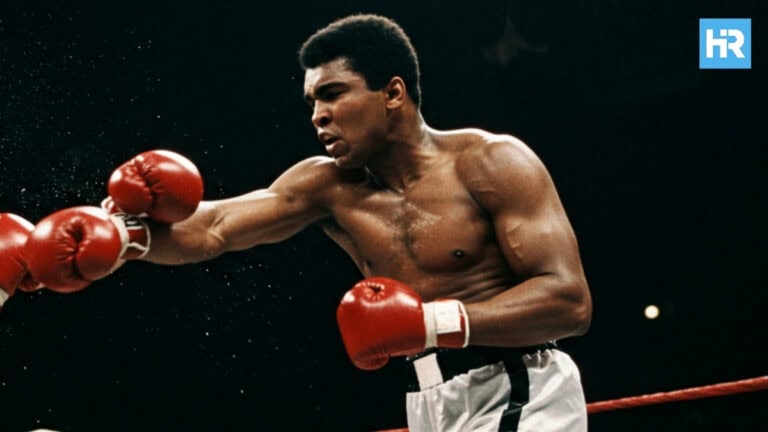
In the intense heat of a Philippine morning, Muhammad Ali and Joe Frazier met for the third and final time in a heavyweight title bout that would become one of the most storied events in boxing history. The fight took place at 10:00 a.m. local time on October 1, 1975, at the Araneta Coliseum in Quezon City, part of the Metro Manila region in the Philippines. Due to time zone differences, the fight aired in the United States on September 30.
Dubbed the “Thrilla in Manila”, the bout lasted 14 rounds and was ultimately stopped when Frazier’s trainer, Eddie Futch, refused to let his fighter continue. Ali was declared the winner by technical knockout (TKO). Ali later described the experience as “the closest thing to dying” and referred to Joe Frazier as “the greatest fighter of all times, next to me.”
The fight was watched by over 500,000 viewers via pay-per-view, a record at the time. It was the first continuous global satellite signal ever delivered by HBO, which had launched in 1972.
- Muhammad Ali won the 14-round “Thrilla in Manila” against Joe Frazier on October 1, 1975, after Frazier’s trainer stopped the fight before the final round.
- The fight took place in Quezon City, Philippines, in extreme heat over 120°F, pushing both fighters to their physical and mental limits.
- HBO’s live satellite broadcast of the bout was the first continuous global sports transmission and helped establish the modern pay-per-view model.
A Rivalry Built on Respect, Betrayal, and Bitterness
Muhammad Ali and Joe Frazier’s relationship was complex and deeply personal. Their trilogy began with the “Fight of the Century” on March 8, 1971, at Madison Square Garden in New York City, where Frazier defeated Ali by unanimous decision after 15 rounds, scoring a knockdown in the final round.
This came after Ali had been stripped of his boxing license and heavyweight title in 1967 for refusing to be drafted into the Vietnam War. During Ali’s exile, Frazier supported him, including lending him money and advocating for his reinstatement. However, when Ali returned, he began verbally attacking Frazier, calling him, among other things, an “Uncle Tom.”
The animosity escalated since Frazier, who had grown up on a sharecropper’s farm in South Carolina, saw Ali’s attacks not as promotion but as a personal betrayal. Ali, who once referred to Frazier as “ignorant,” “ugly,” “stupid,” and a “gorilla,” directed insults that went beyond the ring. He frequently referred to Frazier by the name “Clay,” which Ali had abandoned upon converting to Islam. Needless to say, this stoked deep anger in Frazier, acting as fuel to defeat Ali.
Their second fight, held in 1974 in New York City, ended in a decision win for Ali, evening the series. Before that bout, the two engaged in a real physical altercation during a television appearance with Howard Cosell, in which they had to be separated by their entourages.
Promoter Don King and the Path to Manila
The final fight of the trilogy was promoted by Don King, who had also orchestrated Ali’s bout with George Foreman in 1974, known as the “Rumble in the Jungle.” King secured millions of dollars from Philippine President Ferdinand Marcos to stage the fight in the Philippines. Both Marcos and his wife, Imelda Marcos, were present among the 28,000 people in attendance at the Araneta Coliseum.
HBO bought the broadcast rights, and their satellite signal allowed the match to be seen live around the world.The fight became the first continuous satellite transmission of a live sporting event, marking a critical moment in television and sports media history.
The name “Thrilla in Manila” came from one of Ali’s poetic taunts in the lead-up to the fight: “It’ll be a thrilla, and a killa, and a chilla, when I get that gorilla in Manila.”
In the days before the match, Ali’s personal life made headlines when his wife, Belinda, arrived in Manila and confronted him in his hotel room after discovering reports that he had been seen with a 20-year-old woman named Veronica, whom he was introducing as his wife. Belinda reportedly argued with Ali for 15 minutes before returning to the airport.
The Fight: Fourteen Rounds in Extreme Heat
From the opening bell, Ali fought with aggressive intent, trying to knock Frazier out early. In the first round, he landed big punches and buckled Frazier’s knees twice. However, Frazier’s legendary resilience showed itself again when he began absorbing Ali’s punishment and gaining momentum by round five.
Between rounds six and ten, Frazier controlled the pace by going for Ali’s body alongside plenty of vicious left hooks to the head, forcing Ali to the ropes and causing him visible distress. According to observers, by the end of the tenth round, Ali sat on his stool exhausted, with his head bowed. Some believed he was close to quitting.
Ali’s longtime business manager, Gene Kilroy, who sat ringside, said, “I was thinking to myself, why don’t they just ban boxing now?” The punishment Ali took included hooks that “almost made it look like his head was on a swivel,” according to Ed Schuyler Jr., a retired Associated Press boxing writer.
Despite the beating, Ali rebounded. In rounds twelve through fourteen, he landed clean, heavy right hands, and Frazier’s face became so swollen that he could barely see. Frazier was already visually impaired in his right eye, due to an accident from 10 years earlier. His left eye was now nearly shut.
Before the fifteenth round, Eddie Futch decided to stop the fight. He told his fighter, “Joe, I’m going to stop it.”
Frazier replied, “No, no, Eddie, you can’t do that to me.”
Futch responded, “You couldn’t see in the last two rounds. What makes you think ya gonna see on the fifteenth?”
“I want him, boss,” said Frazier, attempting to stand.
“Sit down, son,” Futch said, placing a hand on Frazier’s shoulder. “It’s all over. No one will forget what you did here today.”
At the same time, Ali asked his corner to cut his gloves off, possibly signaling that he, too, was ready to quit. His cornerman, Wali Muhammad, later said, “cut ’em off,” referring to Ali’s gloves. But Angelo Dundee ignored the request and continued preparing him for the next round. The final round never came.
What Happened After
Frazier crossed the ring briefly to acknowledge Ali, but the two did not shake hands or embrace after the fight. In interviews that followed, both men spoke with a level of admiration. Frazier said he had hit Ali with “punches that’d bring down the walls of a city.”
Ali admitted the punishment he took from Joe was unlike anything he had experienced and called him “a great champion.”
Following the fight, Frazier would fight only two more times, both efforts ineffective. Ali continued to box but suffered lasting effects from the punishment he endured, eventually being diagnosed with Parkinson’s Syndrome.
Frazier remained bitter about the way he was treated by Ali. When he died in 2011, Ali, who by then had advanced symptoms of Parkinson’s, attended the funeral. A wreath was laid at Frazier’s grave by Ali. It read: “To Joe Frazier from Muhammad Ali. Rest in peace, Joe, until we meet again. Next time we’re not going to fight, we’re just going to hug each other.”









